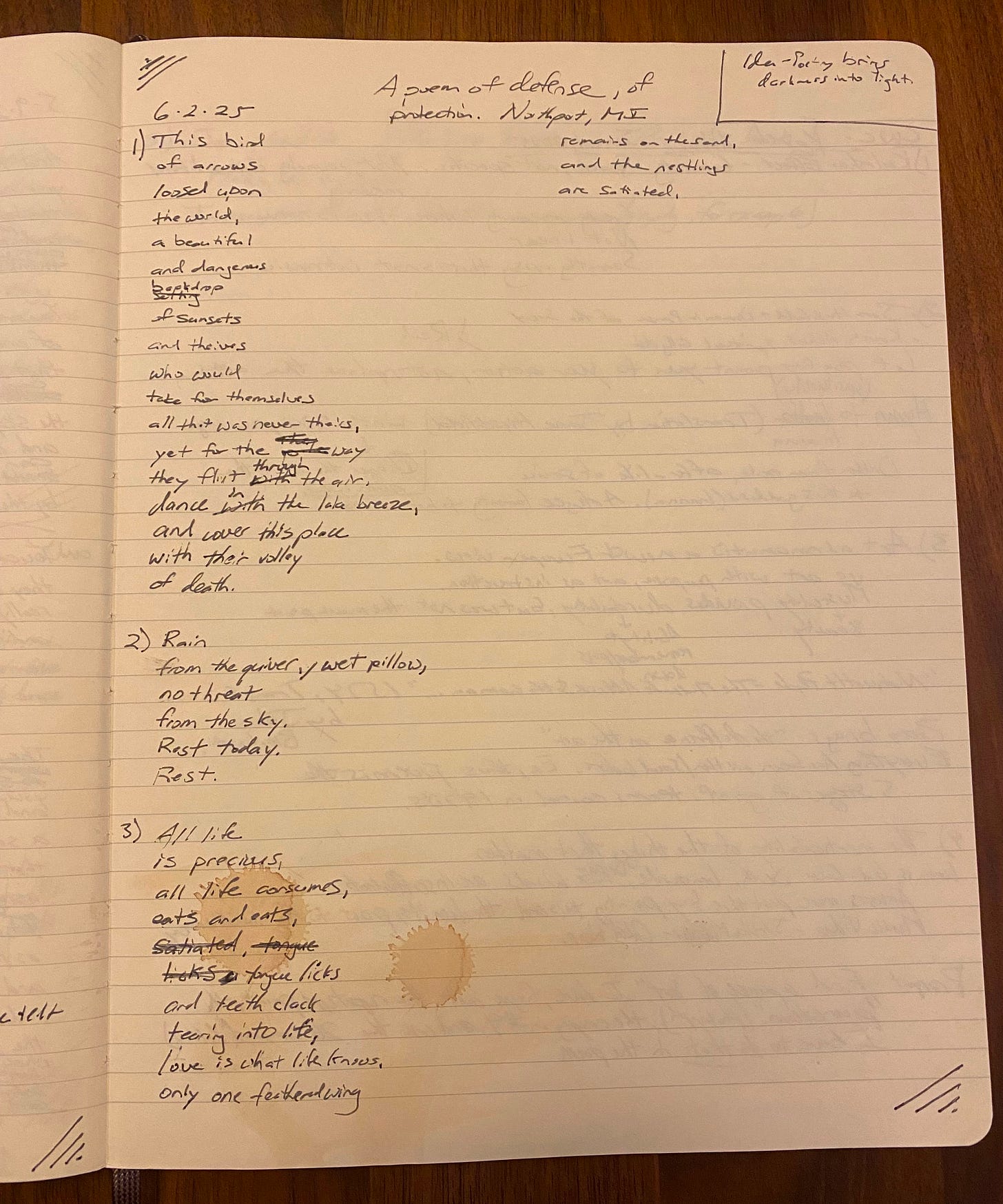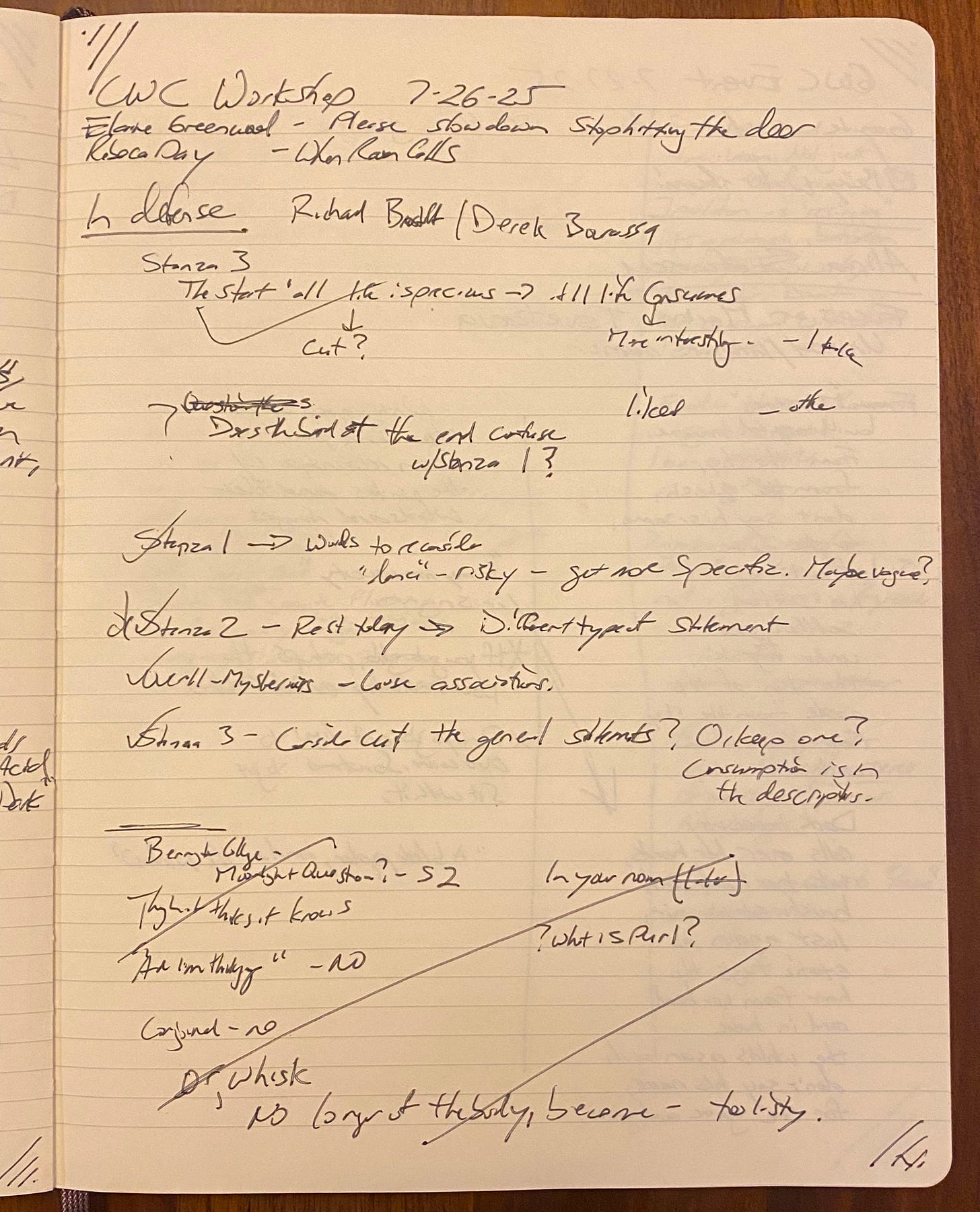From the quiver: A reflection
On editing and feedback
Editing
Shortly after beginning to write poetry, I realized that revision would be a key part of the process. The creative burst that fills a blank page feels like a type of divine inspiration, seeming to appear out of nowhere. Just after the moment, it is quite easy to look at a new creation and call it good. But come back to it a day later and the work that arrived in a creative cloud often seems muddled, not really depicting the emotion or statement it was trying to convey. And that’s ok. Afterall, it is a tall task to make the ethereal concrete using twenty-six letters. It becomes clear that the divine asks for some human sweat to move forward.
Holding an original work in a non-precious manner almost always leads to a better outcome. The writing and rewriting, strikethroughs and stanza migration, and hours spent with Merriam-Webster can be painful but often are exhilarating. Editing has solidified my belief that focusing on speed or quantity misses the heart of the artistic beat, and believing I can control the heart from the start is a fool’s errand.
While I have been my own editor for years, From the quiver is the first poem that I have written where the editing process took the next step by accepting feedback from other poets.
Five months ago, I joined Maya Popa’s writing community, Conscious Writers Collective (CWC). This online space offers educational sessions and experiences from poets and writers who have been successful at finding their voice and releasing it into the wild. Powerfully, this collective also offers a place to workshop writing with other poets, working together in a way where we uncover more about our own voice.
Feedback
The first draft of From the quiver was written on a beach in northern Michigan in early June using my Garden Walk methodology, simply walking with notebook in tow, then pausing to write in whatever way inspiration strikes, and repeating until the walk or series of walks ends. Each brief writing session becomes a small poem in a series that comes together to form a larger, completed poem. There is a faith in this process of immediacy that the various sub-poems of the walk will fit together in some way, shape, or form.
This Garden Walk extended over three consecutive days...an extended walk of sorts. The first poem occurred on a beautiful morning nestled in the sand dunes overlooking Lake Michigan, watching birds erratically fly in and out of a bird house to scrounge for bugs. The next was developed the following morning while lounging in the sunroom of the small house we had rented, set further back from the water than where I was the day before, but looking at the same view, except the morning was rainy, grey, and the birds had abandoned the sky. The final emerged the third morning while on a beach walk with my dog around sunrise, enjoying the infinite view of a water horizon, and looking down at the sand and noticing a solitary wing from a bird that had been the victim of some other creature.
I brought this poem to the monthly CWC workshop. The first hour is spent listening to four poets share a poem, then opening it up for Maya and the community to offer their thoughts. The second hour is spent in small breakout groups where each person shares a poem, and the other writers offer critique, questions, and comments. I showed up to this second half with a fair amount of trepidation, rooted in opinions that because a poem is such a personal thing, to accept someone else’s critique of it could cause it to lose something vital that can only come from the author. Essentially, editors be damned.
But the first hour of the workshop taught me that other’s views are a type of personal sixth sense. Poets pay close attention to the world around them through their body and mind, then imprint that on the page. Feedback is simply those original senses filtered through another’s consciousness and returned to the poet through the whole-body experience of experiencing their experience. If a writer is still in tune with oneself, this only moves a work in a more complete direction, improving a poem by making it sharper and more emotional, all while maintaining the author’s voice.
I felt bolstered going into the second hour. When my turn came, I tentatively shared my screen and read From the quiver out loud. The conversation that ensued focused on the sound, wasted words, and eliciting emotion, all with a gentle feeling of nudging, not any demand. I filtered through my notes after the workshop and could clearly see where some of the suggestions resonated with me. The workshop allowed me to add beautiful chords, wield the strikethrough sword, and apply a light sheen of polish.
There was some feedback that did leave me wondering if there was a “right” or “wrong” decision to make. As I consider those notes and feelings, it is helpful to remind myself that this is another sense. Just like a poem with the image of a landscape may describe the sky, the hills, and the flowers, but leave out the details of the crickets or the specific type of cloud, choosing certain views to incorporate and leaving other’s out is the process of writing poetry. There is no wrong outcome. If it tells the story I am telling and elicits an emotion that I am content with, then that is satisfactory!
Graciously, one of the CWC members provided additional feedback on a few more drafts (thank you Richard!) over the coming weeks. After those rounds of editing and after a new title, this poem was finally complete.
Well…complete for now.
Final thought
This reflection says nothing of my intended meaning in this poem, like my reflections often do. If you would like a prompt for reading this piece, read again while pondering the foundational trait of love and the violence that love requires for survival. But you’ve also heard me say, again and again, there is not a wrong way to read poetry. Read and think, read and feel…if you’ve done that, that is all that’s necessary.
May you be wise in your life’s editing…
Brian
If you missed the original “A Poem” post of From the quiver, I hope you will read and enjoy! You can find it here.






Loved seeing the poem AND reading about the process. Thank you so much for the shout out to Conscious Writers Collective. You’re always an invaluable presence in the room, Brian. 🙏🏻
I love watching your evolution 🫶🏼